Faculty of Humanities Department of Japanese Language and Literature Engage with words, contribute through the power of expression
English translation in progress. Thank you for waiting.
Contents
Department Overview
This Department is suitable for the following people:
- Those interested in Japanese literature and language
- Those who want to be a Japanese Language Arts teacher
- Those who want to learn in a place with history
Learning Key Points
01. Full support for students who want to become teachers
The Department of Japanese Literature and Linguistics offers a full range of programs for students who wish to become Japanese Language Arts teachers. The Department's small class sizes, support, open mock classes, and exchange events with current faculty members are all attractive features of the Department's unique approach.
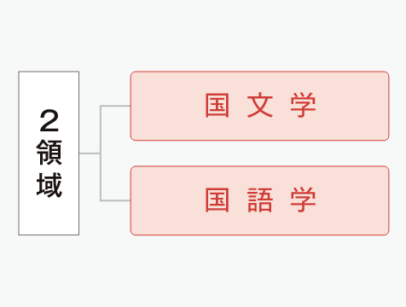
02. Enrollment models for diverse career paths
① Obtain a teaching license (junior high school, high school teacher)
② Become a Librarian
③ Become a Japanese language teacher
④ Become employed as a government employee
⑤ Become employed in a company
⑥ Advance to graduate school
We offer six enrollment models for possible career paths. They allow students to study with a clear vision of their future.
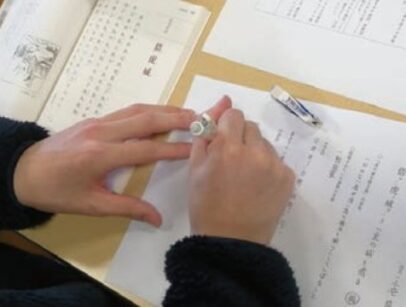
03. Extracurricular exercises such as Independent Seminars and library facilities are also available
The voluntary study group, "輪講 Rinko (Independent Seminar)" sometimes travels to places related to literature, and other activities beyond the campus are also very active. The affiliated Tenri Central Library, Information Library, and Joint Research Laboratory are well stocked with books and other materials, providing an ideal environment for learning.
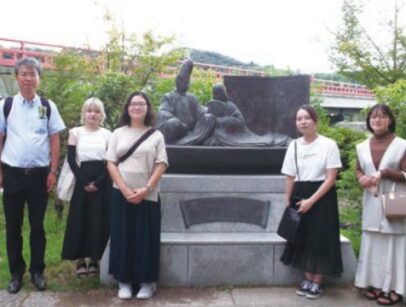
Enrollment models and qualification models that make the most of what students learn for the future
"Teaching" qualification model (Language Arts)
Students aim to obtain a First Class Junior High School Teaching License and a First Class High School Teaching License (Language Arts)
- Future vision: Language Arts teacher at Junior High School and High School
"Librarian" qualification model
Students aim to become librarians working in public libraries, etc., and to obtain certification
- Future vision: Librarian
"Japanese language teacher" qualification model
Students aim to become Japanese language teachers who teach Japanese to non-native speakers of Japanese.
- Future vision: Japanese language teacher
"Government employee" enrollment model
Students aim to become national or local government employees and pass the civil service examinations.
- Future vision: National or local government employee
"General employment" enrollment model
Students aim to find employment in general companies, such as career-track and sales positions.
- Future vision: General business
"Graduate School Preparation" enrollment model (teaching credential recommended)
Students will aim to be admitted to the Master's Program of the Graduate School.
- Future vision: Admittance to a graduate school
Four-year learning process
First-year
続きを読むAcquire basic knowledge and thought
Based on the study of "Language Arts" up until high school, students will develop the ability to communicate their thoughts in words while learning basic knowledge and thoughts of Japanese liturature and Japanese linguistics, which are further deepened from there.
Representative classes
 ・Seminar in the Basics of Japanese Linguistics
・Seminar in the Basics of Japanese Linguistics
While learning the basic knowledge of Japanese linguistics, students will master how to use information processing equipment to input data and make use of it. Students will aslo acquire the skills necessary for writing reports on Japanese language studies.
Second-year
続きを読むAcquire specialized knowledge and thinking
Students will accumulate knowledge to think from a specialized perspective. The unique feature of “Tenri Liturature” is that students can learn beyond the barriers of classification such as each field and period.
Representative classes
 ・The History of Modern Japanese Literature
・The History of Modern Japanese Literature
Literary works are produced under the influence of social backgrounds. The subjects will use a variety of keywords such as “interior,” “media,” and “urban space” to capture the genealogy of literary works in a diachronic manner.
Third-year
続きを読むThink logically and acquire the “ability to communicate"
Students put into practice the knowledge and thinking acquired in their first and second years. In order to accurately convey one's thoughts to others, students hone their ability to construct logically and communicate effectively.
Representative classes
 ・Seminar in Japanese Literature (Ancient)
・Seminar in Japanese Literature (Ancient)
This subject is a close reading of literary works established in the Nara period. Students will read the works in their original texts, research related literature, and prepare and present materials. Students will develop logical thinking and communication skills.
Fourth-year
続きを読むWork on a graduation thesis as the culmination of your studies
【Examples of graduation thesis themes】
- (上代)『萬葉集』における枕詞の研究 —色名のつくものを中心に —
(Ancient) A Study of Pillow Words (decorative word used prefixally in classical Japanese literature) in the Manyoshu —Focusing on the Pillow Words with Color Names — - (中古)『源氏物語』宿木巻の月について —「忌む」文化の再考 —
(Medieval) The Moon of the Yadorigi "The Ivy"of the Tale of Genji—Reconsidering the Culture of 忌む — - (近世)井原西鶴『男色大鑑』の研究 —女性の描写に目を向けて —
(Modern) A Study of Saikaku Ihara's The Great Mirror of Male Love —Looking at the Portrayal of Women — - (近代)芥川龍之介『蜜柑』論 —描かれる色彩の役割について —
(Present)Ryunosuke Akutagawa Mikan (mandarin orange) Theory —The Roles of Colors Depicted — - (国語学)和歌山方言について —紀北地域の否定形式を中心に —
(Japanese Linguistics) On the Wakayama Dialect — Focusing on the Negative Forms in the Kihoku Region —
- (上代)『萬葉集』における枕詞の研究 —色名のつくものを中心に —
Employment Results and Qualifications
Employment Rate 92%
※Actual employment results for graduates of the Department of Japanese Language and Literature, Faculty of Letters in March 2023
Major employers (information for the most recent 5 years)
ARNEST ONE CORPORATION, Wacoal Corp., France BeD Co., Ltd., Kansai Art Printing, Inc., Daiwa Industries Ltd., Ogawa Pump Industrial Company, KANSAI MARUWA LOGISTICS INC., Cactus Co., Ltd., Road Car Corporation, FANCL CORPORATION, DAIDO Corporation, JINS Inc., AEONMALL Corporation, Family Mart Co., Ltd., Asahi Co., Ltd., First Group Inc., Francfranc Corporation, ena Co., Ltd., Sugi Holdings Co., Ltd., MatsukiyoCokokara & Co., Yamato Shinkin Bank Ltd., ACT-ONE Yamaichi Co., Ltd., Willway Co., Ltd., Japanese Red Cross Society, Tenri Hospital, Japan Post Co., Ltd., JA Naraken, Teacher (Wakayama, Nara, Toyama, Osaka, Tenri High School), Japan Ministry of Defense, Police (Nara Prefecture), Nara Prefecture Wide Area Fire Department Association, etc. (listed in no particular order)
Available Qualifications
- First Class Junior High School Teaching License (Language Arts)
- First Class High School Teaching License (Language Arts)
- Qualification for appointment as a social welfare administrator
- Librarian
- Museum curator
- Japanese language teacher
- Corrections and Rehabilitation
- Missionary of the Tenrikyo church
Faculty list
Curriculum
Curriculum tree(PDF)
Curriculum map(PDF)
Education Policy
Admission Policy
In order to fulfill the educational goals of the Department of Japanese Language and Literature, we seek for students with the following qualities:
1.(Thought) Those who wish to acquire the ability of logical thinking.
2.(Knowledge) Those who wish to acquire the knowledge regarding Japanese literature and language.
3.(Attitude) Those who wish to acquire communication skills.
4.(Creativity) Those who wish to acquire the ability to create new things.
5.(Action) Those who wish to acquire the ability to deliver new knowledge.
6.(Motivation) Those who have had experience in actively engaging in social activities and extracurricular activities, and have an interest in the studies of the Japanese language and literature.
Entrance examination methods will take various forms, such as comprehensive selection, special selection, school recommended selection, general selection, and transfer selection.Curriculum Policy
We systematically distribute subjects that allow students to deepen their knowledge in the specialized field of Japanese language and literature, study the basics of Japanese literature and linguistics, and study the deepened contents of each era and field.
The classes are organized so that during the first year, students have basic seminars and introductory classes. During the second year, they will enroll in advanced subjects. During the third and fourth years, students will choose subjects related to their preferred era. Further, during the third and fourth year, the curriculum is organized so that students can take seminars that cover the overall studies, which will prepare them to write their Graduation Thesis.Diploma Policy
A bachelor's degree (Japanese Literature) will be awarded to students who have acquired the following knowledge and abilities:
1.(Thought) Those who have acquired the ability of logical thinking.
2.(Knowledge) Those who have acquired the knowledge regarding Japanese literature and language.
3.(Attitude) Those who have acquired communication skills.
4.(Creativity) Those who have acquired the ability to create new things.
5.(Action) Those who have acquired the ability to deliver new knowledge.

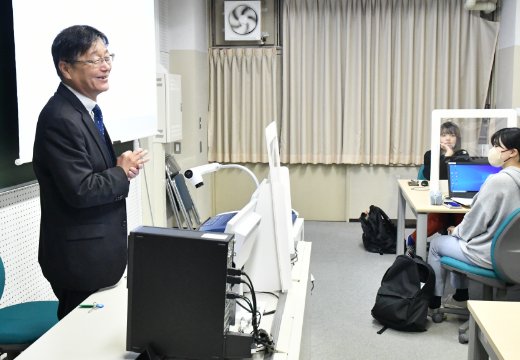 ・Seminar in the Basics of Japanese Linguistics
・Seminar in the Basics of Japanese Linguistics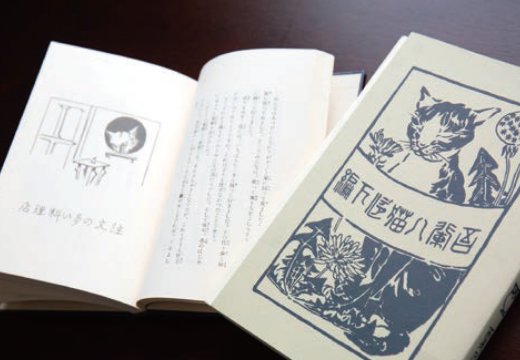 ・The History of Modern Japanese Literature
・The History of Modern Japanese Literature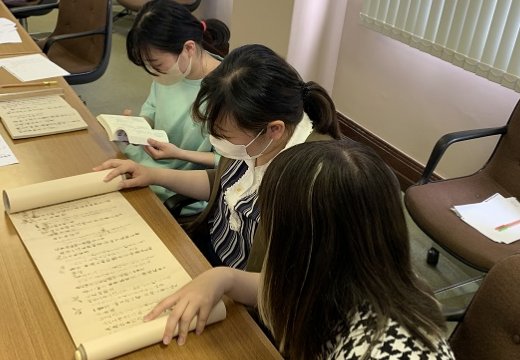 ・Seminar in Japanese Literature (Ancient)
・Seminar in Japanese Literature (Ancient)